Cats are usually one of the most affectionate domestic pets, but can be pretty picky in selecting the objects of their love, care and affection. They are moody, as they fall under the solitary animal’s umbrella and often view their peers as rivals- sometimes even with suspicion and fear.
Cats are independent in terms of grooming and training; however, handling a malnourished cat can be tricky and challenging for the owner. While dogs tend to be more honest, open, and docile, cats, on the other hand, are more aloof and indecipherable- as they demand their owners to accept them the way they are, without revealing what terms or conditions apply.
Read more: Basics of Cat Grooming: How to Maintain your Feline’s Overall Hygiene
Does it break your heart to see your cat malnourished, all skin and bones? Have you encountered a stray malnourished cat on the street in the cold? Looking for high-calorie cat food options for your beloved pet? Curious to know if your cat is underweight? Don’t worry; you have landed on the right page, as this article encompasses all details related to ideal cat weight, malnourishment symptoms, and high-calorie cat food to fatten a cat in no time.
Fat cat or malnourished cat?
You might have heard the term fat cat before; however, a skinny cat is something that only a few people are aware of. A cat is usually overweight if it weighs 10 to 20 percent more than its ideal weight. Feline obesity is quite common among cats and poses significant health hazards such as metabolic disorders, arthritis, weak immune system, and cardiovascular diseases. In such cases, diet and feeding strategies can be helpful for healthy weight management.
We all know that cats are picky eaters, as they might like some food for some time and then quit it altogether. Feline weight loss among cats is a serious health hazard- resulting from a negative caloric balance. It usually occurs when the body uses or excretes healthy nutrients faster than the consumed calories.
Weight loss in cat needs clinical attention, especially when it surpasses 10 percent of the average body weight with zero fluid loss. During such a condition, a cat’s appetite may be normal, increased or decreased, making it difficult for you to predict or diagnose the actual problem. In such a case, you should always consult a vet and watch out for other associated symptoms such as vomiting, difficulty swallowing, poor hair coat, or regurgitation.
Is my cat underweight?
Cat owners often need help deciding whether their cat is underweight or overweight. Unlike humans, your kitty does not require a scale to diagnose the actual problem, as a simple body condition check can help determine if your cat is underweight.
Check your cat’s ribs
Gently run a hand over your cat’s side and try to feel the ribs. Check if there is a significant layer of fat over the ribs. If yes, your cat is overweight. On the other hand, if you feel no fat on the ribs and just some flesh between their ribs and skin, your cat is underweight or malnourished.
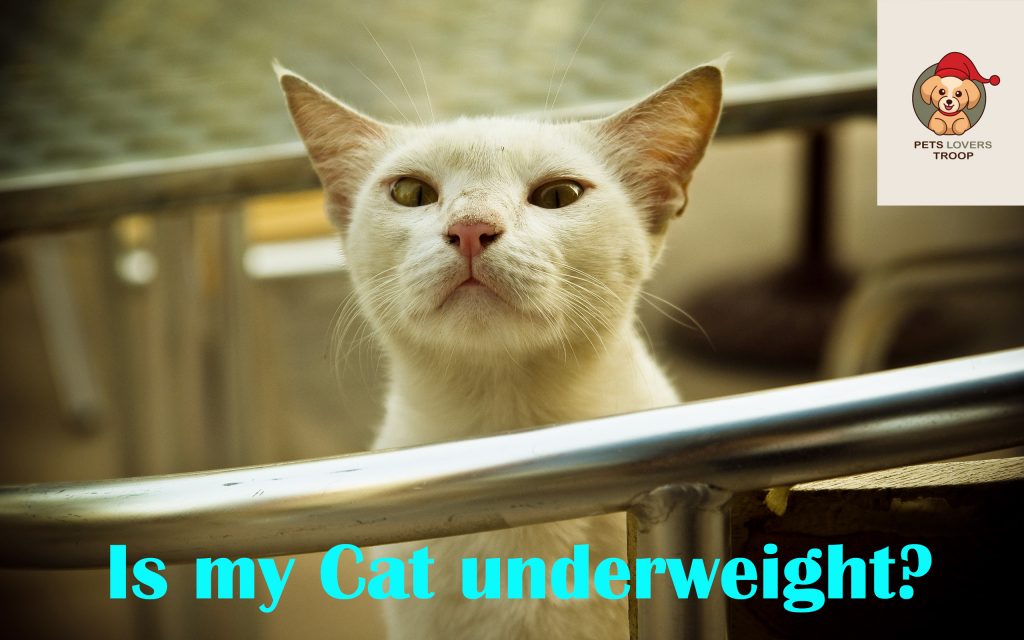
Check around your cat’s spine
Just like the ribs check, perform the same test on your cat’s spine. If the bones or vertebrae feel bony, your cat is malnourished. You can also use online body condition scores for better evaluate malnourished cat.
Signs/Symptoms of malnourished cats
- You can easily see or feel their backbone and ribs
- They have a minimal covering of fat
- They have a minimal waist, when viewed from above
- They have a tad tucked-in stomach
If your cat has the symptoms mentioned above, consult your vet without delay. They may recommend the best cat food for weight gain or plan a specialized diet of protein and fat to reach optimal weight.
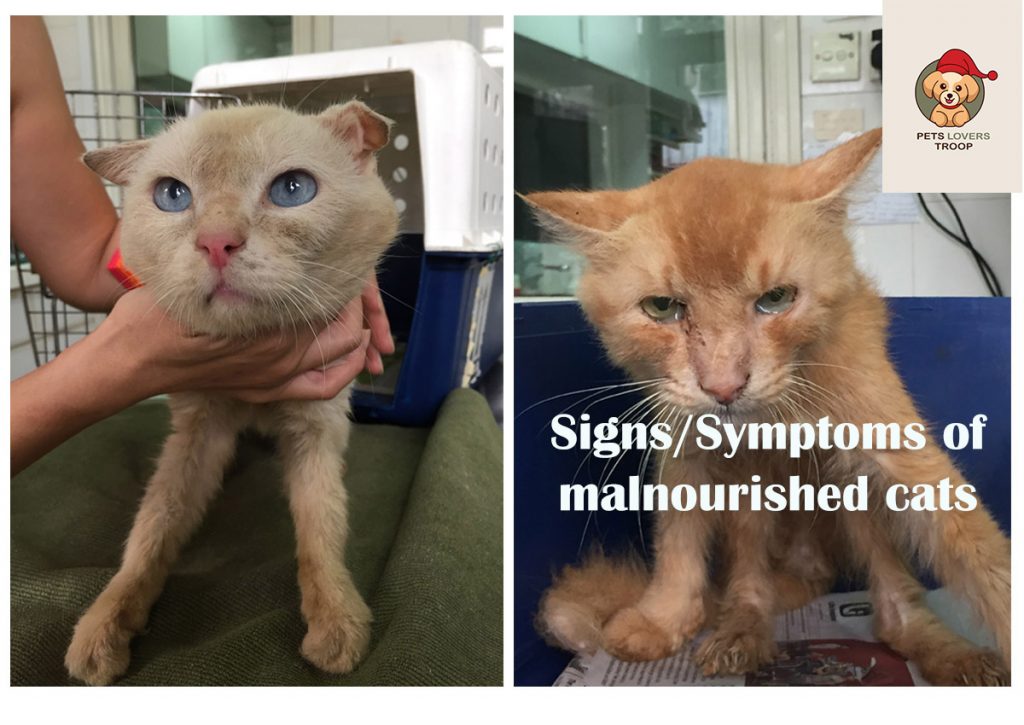
Why is my cat overweight, and what to do?
Cats are very active, which allows them to burn food calories in no time. However, high-calorie cat food without exercise can lead to weight gain or obesity among cats. If your cat is slightly overweight, you need to worry, as cats love their favorite food and overindulge.
Before consulting a vet, ask yourself: Am I feeding too much high-calorie cat food, or have I recently changed cat treats to reward my kitty? If yes, research the foods that help cats gain weight and try to avoid them as much as possible.
Another way is to check the recommended amount of food your cat needs in each serving and compare it with the food packaging. Try and weigh out the recommended amount with the help of your kitchen scale. Your vet can also advise regarding the weight management programs for your cat- restricting fat and carbohydrates, while feeding appropriate amounts of protein and nutrients to maintain their overall health.
On a personal level, you can also cut out treats or snacks to facilitate a slow and steady weight loss which may take a year. Also, outdoor cats use their energy for hunting, while indoor cats have fewer opportunities to exercise or burn calories. If walking from the sofa to the food bowl is the only exercise your cat indulges in, try to make time for some outdoor playtime. They love to play with toys such as rods, bowls, etc. Please encourage them to be active such as climbing trees or perches.
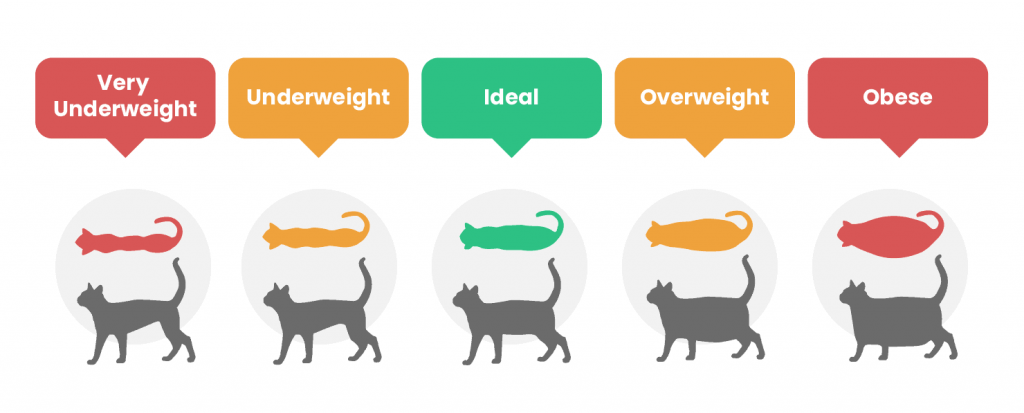
Why is my cat losing weight?
This is the real question: Is my cat underweight, and what can be done to control it before it’s too late? Ask yourself: Am I feeding enough amount of food to my kitty? Does my cat have a decent desire for food? Is my cat stressed out or showing signs of depression? Is my cat sick or showing early signs of some illness?
Remember, cats only lose weight when they are not eating ample food. If they are not eating well, try to tempt them with small meals that are easy to digest but are full of nutrients. Also, consult a vet if your cat hasn’t ingested it for over three days or more.
Read More: Signs of malnourished cat
Your vet may prescribe a weight gain supplement for your cat or assist in feeding them. Depending on the situation, the vet may carry out some blood tests to determine if your cat is suffering from a kidney or liver disease or whether they have diabetes or hyperthyroidism.
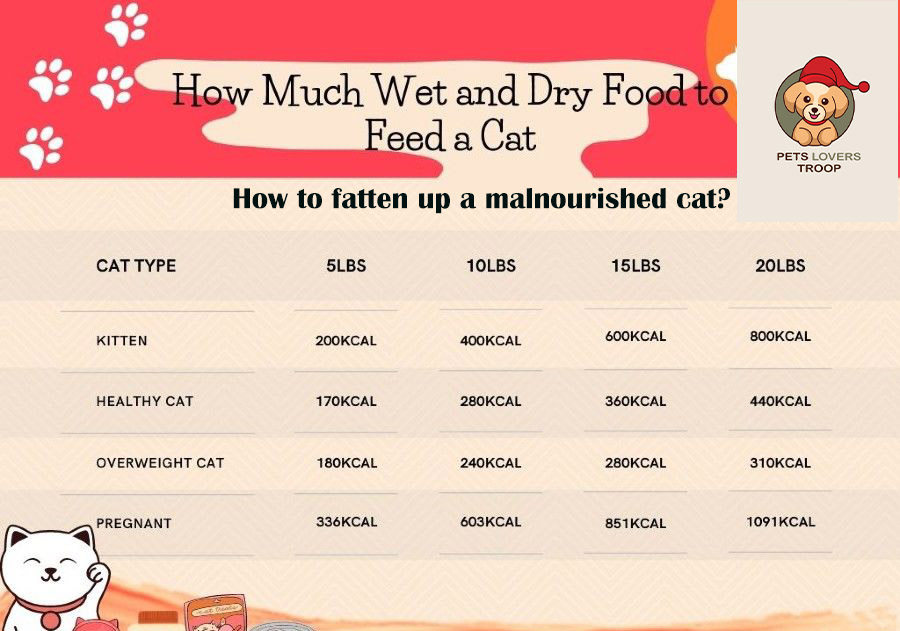
What is a healthy cat’s weight?
Are you looking for a cat overweight chart? Want to know how much cats weigh? Don’t worry; we have got your back. Firstly, you need to understand that both an overweight cat and a malnourished cat are unhealthy and prone to diseases. Keeping this in mind, the only way to fatten up your malnourished cat is to buy the right weight gain supplement for them. Also, incorporating healthy activities can also facilitate weight gain.
A healthy cat’s weight range varies depending on your cat’s breed. For some cats, the ideal weight is 10 pounds or 4/4.5 kilograms, while for some, it can be as much as 25 pounds or 11 kilograms. Smaller cat breeds usually weigh around 5 pounds or 2.2 kilograms.
Do you have a Malnourished Cat: Rule out medical conditions first
Firstly, you need to rule out the possibility of any medical condition or disease. If your cat is underweight, it is usually recommended to visit a vet to find the reasons behind its rapid weight loss. Some common underlying medical conditions include:
- Dental problems
- Parasites
- Food allergies/sensitivities
- Hyperthyroidism
- Infections
- Inflammatory Bowel Disease
A vet may perform a physical evaluation, followed by biological samples such as cat feces or blood. After the results, if the vet finds out that your cat is malnourished due to a medical condition, they might suggest treatment or a specific diet. However, if there is no underlying medical reason behind it, they may recommend a weight management program for your malnourished cat.
Review other external factors as well
After ruling out any underlying medical reasons, you should also review other external factors that might be the actual cause of malnourishment. These can include:
- Quality of their current diet regime (their food might lack an adequate amount of fats, carbohydrates, and amino acids)
- Environmental factors (such as the food bowl may be close to loud machines or a noisy area, or it might be around the litter box)
How to fatten up a malnourished cat?
Are you puzzled why your cat is losing weight? Looking for foods to help cats gain weight? Don’t worry; we have listed down the best ways to fatten up your malnourished cat below:
Use high-quality canned kitten food.
Canned kitten foods usually have more fat and protein per gram than adult cat canned foods. This is because young kittens require an additional source of fatty acids and amino acids to facilitate growth and build up their organs and muscle strength.
Use fresh or wet food.
Fresh or wet food holds more protein and a lesser amount of carbohydrates than dry foods. Cats losing their appetite enjoy fresh or wet food more than dry food.
Gradually increase food consumption.
Do not feed your cat large amount of food for weight gain in one go. Try to divide the diet into smaller portions and gradually increase food consumption patterns. With the increase, reduce the number of feeding sessions number.
Use fish oil supplement.
Fish oil supplement is one of the best cat foods for weight gain and an excellent way to increase caloric intake. It also holds additional benefits, such as making your cat’s fur healthier and shinier and enhancing its flavor profile. They are also an excellent source of omega fatty acids.
Healthy homemade cat treats.
Boiled chicken and eggs are also a good source of increasing your malnourished cat’s caloric intake. Use boiled foods, not fried ones, with no salt or condiment. You can use these homemade treats as a reward for finishing the meal or mix them with regular meals to enhance their flavor profile.
Attractive food appeals to cat’s.
Some cats can be moody and fussy when it comes to consuming food. For them, the key is to sneak healthy calories into their everyday meals, such as using broth from boiled chicken in cat food. The food’s consistency, presentation, and temperature also play a role here. Many cats like prewarmed foods, while some like foods at a specific temperature.
Myriad options can work.
Some cats prefer more varied food or specific type of recipes. Choose high-quality cat food on a trial-and-error basis- as you might come across a high-calorie cat food that they might like. Remember, offering them a diverse range of foods can help you to pick and choose their specific preferences.
Check if they have intolerances or sensitivities.
Intolerances and sensitivities can also be one of the reasons behind your malnourished cat. These sensitivities develop with time, which may make it difficult for your cat to accept and digest food that was previously working for them. Some common signs can be diarrhea, vomits, smelly gas, boating, loose feces, etc.
High-calorie supplement for cats
Are you looking for the best cat food for weight gain? Are you tired of researching high-calorie supplements for cats in the local market? Looking for ways to fatten up your cat? Don’t worry; we have compiled a list of the best weight gain supplement for cats that will help them gain healthy weight in no time.
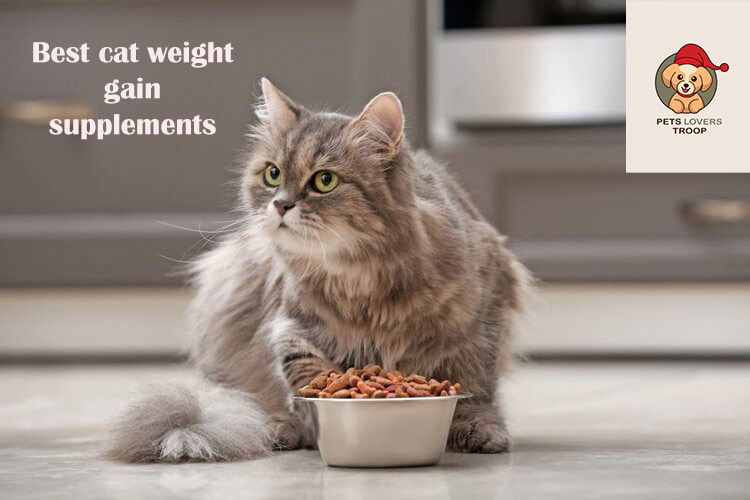
Weight gain supplements for cats are available in various forms and sizes. Some are liquid, while others are in gel form. You can be lucky by mixing weight gain supplements into your cat’s everyday meals. However, the success of this strategy lies in your cat’s consuming it, mainly if they are a picky eater. Some high-calorie cat food weight gain supplements include:
- Miracle Vet High-Calorie Weight Gainer
- TOMLYN Nutri-Cal High-Calorie Nutritional Gel
- Lexelium Weight Gainer and Appetite Stimulant.
- Thomas Labs Mega Cal Supplement
- Vetoquinol Nutri-Cal Gel
- PetAg KMR Powder Milk Supplement for Kittens
- Weather Ready Cal for Cats & Dogs
Read More: How to help your cat get healthy: Fantastic cat supplements for weight gain
Remember, not all cats require a weight gain supplement, even if they are underweight or malnourished. These weight gain supplements are usually designed for sick and injured cats or cats recovering from surgery. They are also used to improve their overall appearance, weight, and healthy coat. Also, pregnant or lactating cats can use these supplements as a quick source of energy and calories. Remember that these supplements are not meant to replace food but to supplement them. Please consult a vet, before starting a weight gain supplement.



